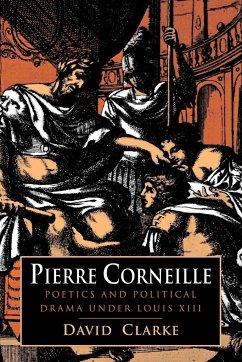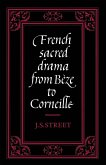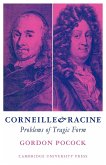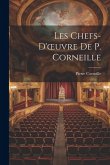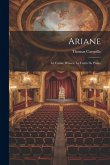- Broschiertes Buch
- Merkliste
- Auf die Merkliste
- Bewerten Bewerten
- Teilen
- Produkt teilen
- Produkterinnerung
- Produkterinnerung
David Clarke explores the serious plays that Corneille wrote between 1630 and 1643.
Andere Kunden interessierten sich auch für
![The Tragic Heroines Of Pierre Corneille The Tragic Heroines Of Pierre Corneille]() Charles Carlton AyerThe Tragic Heroines Of Pierre Corneille16,99 €
Charles Carlton AyerThe Tragic Heroines Of Pierre Corneille16,99 €![French Sacred Drama from B Ze to Corneille French Sacred Drama from B Ze to Corneille]() J. S. StreetFrench Sacred Drama from B Ze to Corneille56,99 €
J. S. StreetFrench Sacred Drama from B Ze to Corneille56,99 €![Corneille and Racine Corneille and Racine]() Gordon J. PocockCorneille and Racine38,99 €
Gordon J. PocockCorneille and Racine38,99 €![Les Chefs-D'oeuvre De P. Corneille Les Chefs-D'oeuvre De P. Corneille]() Pierre CorneilleLes Chefs-D'oeuvre De P. Corneille25,99 €
Pierre CorneilleLes Chefs-D'oeuvre De P. Corneille25,99 €![Catalogue des Livres de la Bibliothéque de M. Pierre Antoine Bolongaro Crevenna Catalogue des Livres de la Bibliothéque de M. Pierre Antoine Bolongaro Crevenna]() Pietro Antonio Bolongaro CrevennaCatalogue des Livres de la Bibliothéque de M. Pierre Antoine Bolongaro Crevenna24,99 €
Pietro Antonio Bolongaro CrevennaCatalogue des Livres de la Bibliothéque de M. Pierre Antoine Bolongaro Crevenna24,99 €![Ariane: Le Comte D'essex; Le Festin De Pierre Ariane: Le Comte D'essex; Le Festin De Pierre]() Thomas CorneilleAriane: Le Comte D'essex; Le Festin De Pierre24,99 €
Thomas CorneilleAriane: Le Comte D'essex; Le Festin De Pierre24,99 €![Chefs-D'Oeuvres Dramatiques De P. Et T. Corneille V1 (1783) Chefs-D'Oeuvres Dramatiques De P. Et T. Corneille V1 (1783)]() Pierre CorneilleChefs-D'Oeuvres Dramatiques De P. Et T. Corneille V1 (1783)33,99 €
Pierre CorneilleChefs-D'Oeuvres Dramatiques De P. Et T. Corneille V1 (1783)33,99 €-
-
-
David Clarke explores the serious plays that Corneille wrote between 1630 and 1643.
Hinweis: Dieser Artikel kann nur an eine deutsche Lieferadresse ausgeliefert werden.
Hinweis: Dieser Artikel kann nur an eine deutsche Lieferadresse ausgeliefert werden.
Produktdetails
- Produktdetails
- Verlag: Cambridge University Press
- Seitenzahl: 332
- Erscheinungstermin: 1. November 2008
- Englisch
- Abmessung: 229mm x 152mm x 20mm
- Gewicht: 540g
- ISBN-13: 9780521103954
- ISBN-10: 0521103959
- Artikelnr.: 25686581
- Herstellerkennzeichnung
- Libri GmbH
- Europaallee 1
- 36244 Bad Hersfeld
- gpsr@libri.de
- Verlag: Cambridge University Press
- Seitenzahl: 332
- Erscheinungstermin: 1. November 2008
- Englisch
- Abmessung: 229mm x 152mm x 20mm
- Gewicht: 540g
- ISBN-13: 9780521103954
- ISBN-10: 0521103959
- Artikelnr.: 25686581
- Herstellerkennzeichnung
- Libri GmbH
- Europaallee 1
- 36244 Bad Hersfeld
- gpsr@libri.de
We live in a day of rank apostasy. That apostasy is not limited to the unbelieving world because much of it is accepted by the Christian world. David Clarke hits head on one of the tenets of the apostasy which has exploded internationally. A time like this had been prophesied by Isaiah. Isaiah 3:12 (KJV) As for my people, children are their oppressors, and women rule over them. O my people, they which lead thee cause thee to err, and destroy the way of thy paths. The tenet which David Clarke hits head on is the one of women preachers and women elders in the churches. Isaiah states that women were ruling over the people of God, when the men should have been in leadership roles. The Scripture states that "they which lead thee cause thee to err." In this book you will find a confrontation between elders and the word of God. When church leaders neglect the truths of Scripture and base everything they believe on as their "personal opinion", then the paths have been destroyed for the Christian, as Isaiah teaches. One of the outgrowths of the charismatic movement, is the teaching that women are just as qualified as men to be elders and pastors. This is not to say that women are lacking leadership qualities but the Bible is very clear that they are not to rule over men and are not to have rule in the churches. It is unfortunate that many feminized men in the church kowtow behind the concept that disallowing women rule in the churches is not showing them love. The reality is that being disobedient to the commands of Scripture is nothing more than rebellion against God. 1 Samuel 15:3 speaks about rebellion being as the sin of witchcraft. God has given specific instructions concerning the churches and their structure and who are we to claim that we know more than God. The deep apostasy which many churches have accepted is made visible in this book but not only churches, Bible colleges have also acquiesced to disobeying the Bible and have endorsed women rulers in the church. It is a shame that those who bring the truth are considered the troublemakers in the churches. Tell me, what kind of love do you show someone when you actually help them to be disobedient to God? Will they still love you when they are in hell paying for their sins of rebellion? It is time for Christian men to step up and be men. 1 Corinthians 16:13 (KJV) Watch ye, stand fast in the faith, quit you like men, be strong. This book needs to be in the library of all Christians to help them oppose the i
Introduction
Part I. 'Une Muse de Province'
Part II. Corneille's Conception of Poetic Drama: 1. Theoretical controversy
2. Tradition and originality
Part III. Corneille's Plays Written in the Reign of Louis XIII: 3. Clitandre and Medee
4. Le Cid
5. Horace
6. Cinna
7. Polyeucte and La Mort de Pompee
Conclusion
Notes
Bibliography
Index.
Part I. 'Une Muse de Province'
Part II. Corneille's Conception of Poetic Drama: 1. Theoretical controversy
2. Tradition and originality
Part III. Corneille's Plays Written in the Reign of Louis XIII: 3. Clitandre and Medee
4. Le Cid
5. Horace
6. Cinna
7. Polyeucte and La Mort de Pompee
Conclusion
Notes
Bibliography
Index.
Introduction
Part I. 'Une Muse de Province'
Part II. Corneille's Conception of Poetic Drama: 1. Theoretical controversy
2. Tradition and originality
Part III. Corneille's Plays Written in the Reign of Louis XIII: 3. Clitandre and Medee
4. Le Cid
5. Horace
6. Cinna
7. Polyeucte and La Mort de Pompee
Conclusion
Notes
Bibliography
Index.
Part I. 'Une Muse de Province'
Part II. Corneille's Conception of Poetic Drama: 1. Theoretical controversy
2. Tradition and originality
Part III. Corneille's Plays Written in the Reign of Louis XIII: 3. Clitandre and Medee
4. Le Cid
5. Horace
6. Cinna
7. Polyeucte and La Mort de Pompee
Conclusion
Notes
Bibliography
Index.

